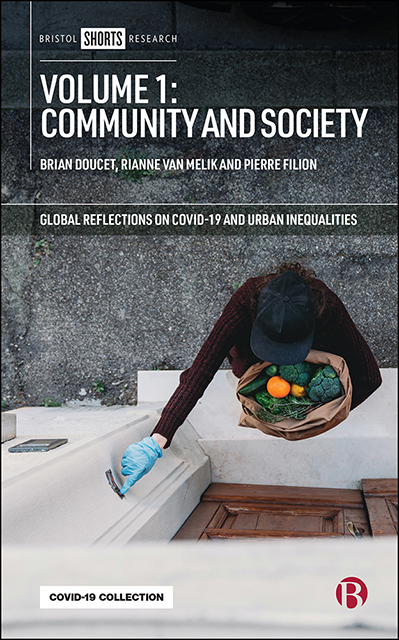Book contents
- Frontmatter
- Contents
- List of Figures and Tables
- Notes on Contributors
- Acknowledgments
- Preface to All Four Volumes of Global Reflections on COVID-19 and Urban Inequalities
- One Introduction
- Part I Working Practices
- Part II Life During Lockdown
- Part III Migration, Migrants, and Refugees
- Part IV Age, Race, Gender, and Ability
- Index
Five - Reflections of Living ‘Hand-to-Mouth’ among ‘Hustlers’ During COVID-19: Insights on the Realities of Poverty in Jamaica
Published online by Cambridge University Press: 13 April 2023
- Frontmatter
- Contents
- List of Figures and Tables
- Notes on Contributors
- Acknowledgments
- Preface to All Four Volumes of Global Reflections on COVID-19 and Urban Inequalities
- One Introduction
- Part I Working Practices
- Part II Life During Lockdown
- Part III Migration, Migrants, and Refugees
- Part IV Age, Race, Gender, and Ability
- Index
Summary
Introduction
This chapter considers effects of the first wave of the pandemic on ‘hustling’ activities due to government lock-down measures in Jamaica. Munive (2010) defines hustling as the everyday survival strategies of the marginalized to capitalize on opportunities to earn an income in extreme economic landscapes. In the spatial context of urban towns, hustling allows individuals to move around the city and make work, while building social ties (Thieme et al, 2021). Hustling is described as a risk-aversion strategy in the context of an unpredictable formal labor market, where diversification of income streams and economic opportunism is required for survival. Hustling is a livelihood mainly engaged in by poor and uneducated populations (Thieme, 2017). The informal labor market is defined as individuals who engage in productive activities that are not taxed or registered by the government. Participants in the sector include self-employed laborers such as street vendors and sellers, own account workers, and labor hired informally. This particular definition takes into account the nature of hustling activities and conforms to a practice that generally occurs in developing countries (Charmes, 1990; see also Turner and Binh, Chapter Two; Thai et al, Volume 3). This is applicable to the Jamaican context.
The formal labor market in the Global South is unable to generate adequate employment opportunities, making hustling an important component of the informal labor market. The ILO (2020) highlighted the impacts of COVID-19 on informal workers in urban areas due to government lockdown measures.
The first section of this chapter will focus on the informal labor market in relation to the ‘right to the city’ in the urban Global South. A description of the methodological approach of the study will be followed by empirical evidence on the effects of the pandemic on hustling; the coping strategies of hustlers, and corresponding impacts on local businesses. Finally, the paper questions traditional approaches to assessing poverty and proposes an alternative approach that captures a realistic insight surrounding the precarity of hustling and risks to poverty.
Right to the city and hustling
‘Urban governance’ and ‘right to the city’ are concepts associated with the management of public space. Harvey (2008) defines the ‘right to the city’ in terms of the individual liberty to access urban space.
- Type
- Chapter
- Information
- Volume 1: Community and Society , pp. 51 - 60Publisher: Bristol University PressPrint publication year: 2021



